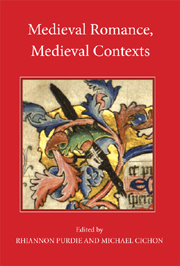Book contents
- Frontmatter
- Contents
- Acknowledgements
- Contributors
- Abbreviations
- Introduction: Romance and its Medieval Contexts
- 1 The Pleasure of Popular Romance: A Prefatory Essay
- 2 Representations of Peasant Speech: Some Literary and Social Contexts for The Taill of Rauf Coilyear
- 3 ‘As ye have brewd, so shal ye drink’: the Proverbial Context of Eger and Grime
- 4 Ekphrasis and Narrative in Emaré and Sir Eglamour of Artois
- 5 What's in a Name? Anglo-Norman Romances or Chansons de geste?
- 6 ‘For Goddes loue, sir, mercy!’: Recontextualising the Modern Critical Text of Floris and Blancheflor
- 7 Roland in England: Contextualising the Middle English Song of Roland
- 8 Romance Baptisms and Theological Contexts in The King of Tars and Sir Ferumbras
- 9 Modern and Medieval Views on Swooning: the Literary and Medical Contexts of Fainting in Romance
- 10 Walking (between) the Lines: Romance as Itinerary/Map
- 11 Romances of Continuity in the English Rous Roll
- 12 ‘Ex Libris domini duncani / Campbell de glenwrquhay/ miles’: The Buik of King Alexander the Conquerour in the household of Sir Duncan Campbell, seventh laird of Glenorchy
- 13 ‘Pur les francs homes amender’: Clerical Authors and the Thirteenth-Century Context of Historical Romance
- Index
- Volumes already published
7 - Roland in England: Contextualising the Middle English Song of Roland
Published online by Cambridge University Press: 12 September 2012
- Frontmatter
- Contents
- Acknowledgements
- Contributors
- Abbreviations
- Introduction: Romance and its Medieval Contexts
- 1 The Pleasure of Popular Romance: A Prefatory Essay
- 2 Representations of Peasant Speech: Some Literary and Social Contexts for The Taill of Rauf Coilyear
- 3 ‘As ye have brewd, so shal ye drink’: the Proverbial Context of Eger and Grime
- 4 Ekphrasis and Narrative in Emaré and Sir Eglamour of Artois
- 5 What's in a Name? Anglo-Norman Romances or Chansons de geste?
- 6 ‘For Goddes loue, sir, mercy!’: Recontextualising the Modern Critical Text of Floris and Blancheflor
- 7 Roland in England: Contextualising the Middle English Song of Roland
- 8 Romance Baptisms and Theological Contexts in The King of Tars and Sir Ferumbras
- 9 Modern and Medieval Views on Swooning: the Literary and Medical Contexts of Fainting in Romance
- 10 Walking (between) the Lines: Romance as Itinerary/Map
- 11 Romances of Continuity in the English Rous Roll
- 12 ‘Ex Libris domini duncani / Campbell de glenwrquhay/ miles’: The Buik of King Alexander the Conquerour in the household of Sir Duncan Campbell, seventh laird of Glenorchy
- 13 ‘Pur les francs homes amender’: Clerical Authors and the Thirteenth-Century Context of Historical Romance
- Index
- Volumes already published
Summary
British Library MS Lansdowne 388 is a composite volume formed by the convenient binding together of a number of quite unrelated smaller manuscripts of different dates. One of these (now folios 381–95) contains the unique Middle English text known as The Song of Roland. The incomplete manuscript copy has no title or running head – The Song of Roland is the title given to this fragmentary medieval poem by its first modern editor. The Catalogue of the Lansdowne Collection describes it as follows: ‘Item 21. A fragment of an old romance, in alliterative metre, on the gests of Charlemagne and Roland. It chiefly relates to the consequences of Ganelon's treachery.’ This is a fair account of the text, and it is notable that the cataloguer makes no reference to the Chanson de Roland as a source of the English poem. By contrast, the first printed edition of the fragment, which is again placed within a composite volume, now brought together with two romances from the London Thornton manuscript, presents it entirely through the lens of its status as ‘the only known English version of the celebrated Chanson de Roland’ (p. xviii). The title page of Herrtage's edition gives authenticity to the invented name by printing it in the same black-letter type and enclosed in the same quotation marks as the titles transcribed from the Thornton manuscript for the other two texts in the volume.
- Type
- Chapter
- Information
- Medieval Romance, Medieval Contexts , pp. 91 - 104Publisher: Boydell & BrewerPrint publication year: 2011



